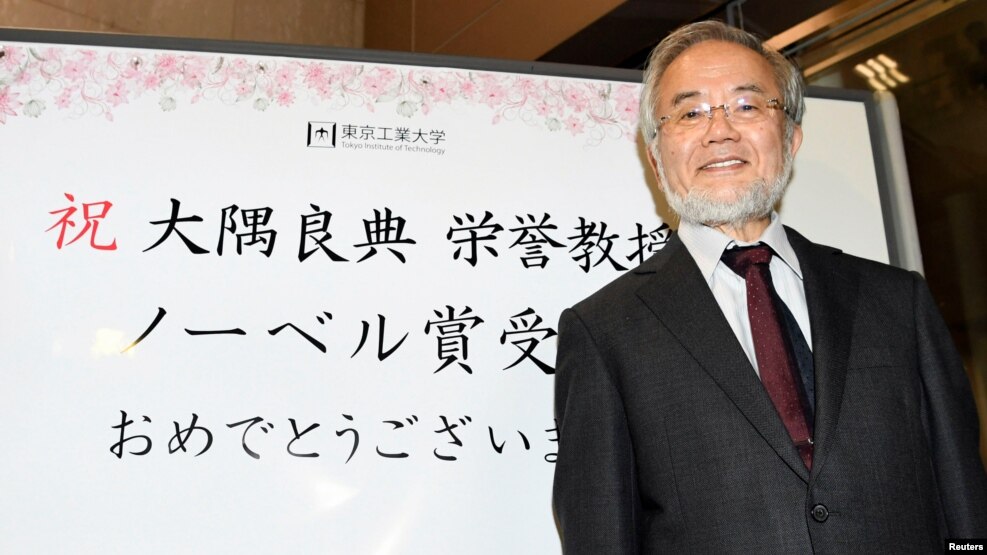Giáo Sư Nhật Yoshinori Ohsumi Đoạt Giải Nobel Y Khoa

Yoshinori Ohsumi, giáo sư của Viện Công nghệ Tokyo, mỉm cười trước một bảng thông báo chúc mừng sau khi ông đã giành được giải thưởng Nobel y học, Yokohama, Nhật Bản, ngày 03 Tháng 10 năm 2016. (Ảnh của hãng tin Kyodo)
Nhà khoa học Nhật Bản Yoshinori Ohsumi đã được trao giải Nobel Y khoa năm nay cho công trình khám phá cơ chế tự thực (autophagy), một nghiên cứu khoa học về cơ chế phân tách và tái tạo của tế bào.
Trong công bố trao giải thưởng 930.000 đôla, Hội đồng Nobel tại Viện Karolinska của Thụy Điển nói:
“Những khám phá của ông đã mở ra sự hiểu biết về tầm quan trọng cơ bản của cơ chế tự thực trong nhiều quá trình sinh lý học, chẳng hạn như sự thích nghi với việc đói hoặc phản ứng với lây nhiễm”.
Ông Ohsumi, 71 tuổi, là một giáo sư tại Viện Công nghệ Tokyo.
Viện Karoliska cho biết thêm: “Cơ chế tự thực đã được biết đến hơn 50 năm, nhưng tầm quan trọng cơ bản của nó trong sinh lý học và trong y học chỉ được công nhận sau nghiên cứu chuyển đổi mô hình của giáo sư Yoshinori Ohsumi trong những năm 1990”.
Cũng theo Viện Karoliska, “Nhờ ông Ohsumi và những người tiếp bước ông mà bây giờ chúng ta biết được rằng cơ chế tự thực điều khiển các chức năng sinh lý quan trọng, nơi các thành phần tế bào cần thoái hóa và tái tạo”.
Giải thưởng y học này là giải Nobel đầu tiên được trao mỗi năm.
Các giải Nobel vật lý, hóa học, hòa bình, kinh tế và văn học sẽ được công bố trong tuần này và tuần tới.
Theo VOA Tiếng Việt
Yoshinori Ohsumi of Japan used baker’s yeast to identify genes essential for autophagy. Credit Akiko Matsushita/Kyodo News, via Associated Press
Yoshinori Ohsumi, a Japanese cell biologist, was awarded the Nobel Prize in Physiology or Medicine on Monday for his discoveries on how cells recycle their content, a process known as autophagy, a Greek term for “self-eating.”
It’s a crucial process. During starvation, cells break down proteins and nonessential components and reuse them for energy. Cells also use autophagy to destroy invading viruses and bacteria, sending them off for recycling. And cells use autophagy to get rid of damaged structures. The process is thought to go awry in cancer, infectious diseases, immunological diseases and neurodegenerative disorders. Disruptions in autophagy are also thought to play a role in aging.
But little was known about how autophagy happens, what genes were involved, or its role in disease and normal development until the early 1990s, when Dr. Ohsumi began studying the process in baker’s yeast.
Why did he win?
The process he studies is critical for cells to survive and to stay healthy. The autophagy genes and the metabolic pathways he discovered in yeast are used by higher organisms, including humans. And mutations in those genes can cause disease. His work led to a new field and inspired hundreds of researchers around the world to study the process and opened a new area of inquiry.
Who is he?
Dr. Ohsumi, who was born in 1945 in Fukuoka, Japan, and received a Ph.D. from the University of Tokyo in 1974, floundered at first, trying to find his way. He started out in chemistry but decided it was too established a field with few opportunities.
So he switched to molecular biology. But his Ph.D. thesis was unimpressive, and he could not find a job. His adviser suggested a postdoctoral position at Rockefeller University in New York, where he was to study in vitro fertilization in mice.
“I grew very frustrated,” he told the Journal of Cell Biology in 2012. He switched to studying the duplication of DNA in yeast. That work led him to a junior professor position at the University of Tokyo where he picked up a microscope and started peering at sacks in yeast where cell components are degraded — work that eventually brought him, at age 43, to the discoveries that the Nobel Assembly recognized on Monday. Dr. Ohsumi later moved to the National Institute for Basic Biology, in Okazaki, and since 2009, he has been a professor at the Tokyo Institute of Technology.
“All I can say is, it’s such an honor,” Dr. Ohsumi told reporters at the Tokyo Institute of Technology after learning he had been awarded the Nobel, according to the Japanese broadcaster NHK. “I’d like to tell young people that not all can be successful in science, but it’s important to rise to the challenge.”
What’s he like?
“He is a quiet man,” said Dr. Beth Levine, director of autophagy research at the University of Texas Southwestern Medical Center in Dallas. But he also is quietly daring.
“Unfortunately, these days, at least in Japan, young scientists want to get a stable job, so they are afraid to take risks,” he told the Journal of Cell Biology. “Most people decide to work on the most popular field because they think that is the easiest way to get a paper published.”
As for himself, he said: “I am not very competitive, so I always look for a new subject to study, even if it is not so popular. If you start from some sort of basic, new observation, you will have plenty to work on.”
Reactions
Dr. Ohsumi’s Nobel Prize “was inevitable,” Dr. Levine said. Dr. Ohsumi, she said, “is venerated in the autophagy field.”
The Japanese prime minister, Shinzo Abe, called Dr. Ohsumi to congratulate him, saying “your research gave light to the people who suffer from serious diseases.”
From The New Yok Times













































